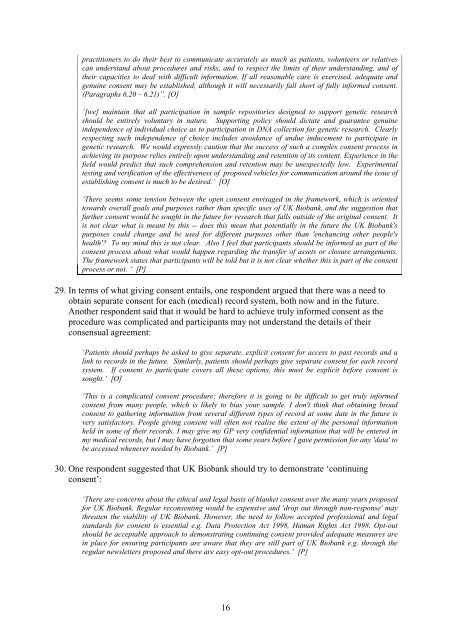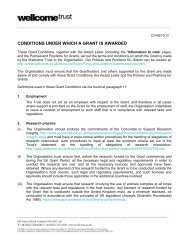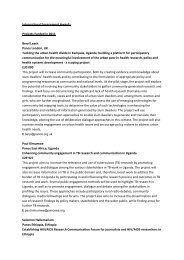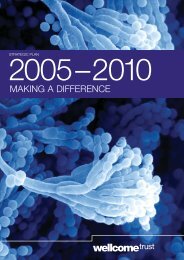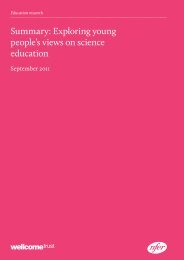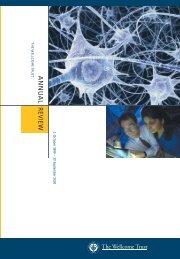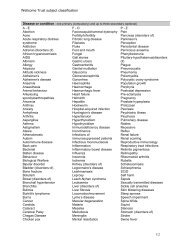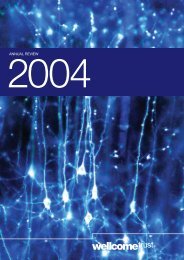UK BIOBANK Ethics and Governance Framework ... - Wellcome Trust
UK BIOBANK Ethics and Governance Framework ... - Wellcome Trust
UK BIOBANK Ethics and Governance Framework ... - Wellcome Trust
Create successful ePaper yourself
Turn your PDF publications into a flip-book with our unique Google optimized e-Paper software.
practitioners to do their best to communicate accurately as much as patients, volunteers or relativescan underst<strong>and</strong> about procedures <strong>and</strong> risks, <strong>and</strong> to respect the limits of their underst<strong>and</strong>ing, <strong>and</strong> oftheir capacities to deal with difficult information. If all reasonable care is exercised, adequate <strong>and</strong>genuine consent may be established, although it will necessarily fall short of fully informed consent.(Paragraphs 6.20 – 6.21)”. [O]‘[we] maintain that all participation in sample repositories designed to support genetic researchshould be entirely voluntary in nature. Supporting policy should dictate <strong>and</strong> guarantee genuineindependence of individual choice as to participation in DNA collection for genetic research. Clearlyrespecting such independence of choice includes avoidance of undue inducement to participate ingenetic research. We would expressly caution that the success of such a complex consent process inachieving its purpose relies entirely upon underst<strong>and</strong>ing <strong>and</strong> retention of its content. Experience in thefield would predict that such comprehension <strong>and</strong> retention may be unexpectedly low. Experimentaltesting <strong>and</strong> verification of the effectiveness of proposed vehicles for communication around the issue ofestablishing consent is much to be desired.’ [O]‘There seems some tension between the open consent envisaged in the framework, which is orientedtowards overall goals <strong>and</strong> purposes rather than specific uses of <strong>UK</strong> Biobank, <strong>and</strong> the suggestion thatfurther consent would be sought in the future for research that falls outside of the original consent. Itis not clear what is meant by this -- does this mean that potentially in the future the <strong>UK</strong> Biobank'spurposes could change <strong>and</strong> be used for different purposes other than 'enchancing other people'shealth'? To my mind this is not clear. Also I feel that participants should be informed as part of theconsent process about what would happen regarding the transfer of assets or closure arrangements.The framework states that participants will be told but it is not clear whether this is part of the consentprocess or not. ‘ [P]29. In terms of what giving consent entails, one respondent argued that there was a need toobtain separate consent for each (medical) record system, both now <strong>and</strong> in the future.Another respondent said that it would be hard to achieve truly informed consent as theprocedure was complicated <strong>and</strong> participants may not underst<strong>and</strong> the details of theirconsensual agreement:‘Patients should perhaps be asked to give separate, explicit consent for access to past records <strong>and</strong> alink to records in the future. Similarly, patients should perhaps give separate consent for each recordsystem. If consent to participate covers all these options, this must be explicit before consent issought.’ [O]‘This is a complicated consent procedure; therefore it is going to be difficult to get truly informedconsent from many people, which is likely to bias your sample. I don't think that obtaining broadconsent to gathering information from several different types of record at some date in the future isvery satisfactory. People giving consent will often not realise the extent of the personal informationheld in some of their records. I may give my GP very confidential information that will be entered inmy medical records, but I may have forgotten that some years before I gave permission for any 'data' tobe accessed whenever needed by Biobank.’ [P]30. One respondent suggested that <strong>UK</strong> Biobank should try to demonstrate ‘continuingconsent’:‘There are concerns about the ethical <strong>and</strong> legal basis of blanket consent over the many years proposedfor <strong>UK</strong> Biobank. Regular reconsenting would be expensive <strong>and</strong> 'drop out through non-response' maythreaten the viability of <strong>UK</strong> Biobank. However, the need to follow accepted professional <strong>and</strong> legalst<strong>and</strong>ards for consent is essential e.g. Data Protection Act 1998, Human Rights Act 1998. Opt-outshould be acceptable approach to demonstrating continuing consent provided adequate measures arein place for ensuring participants are aware that they are still part of <strong>UK</strong> Biobank e.g. through theregular newsletters proposed <strong>and</strong> there are easy opt-out procedures.’ [P]16


